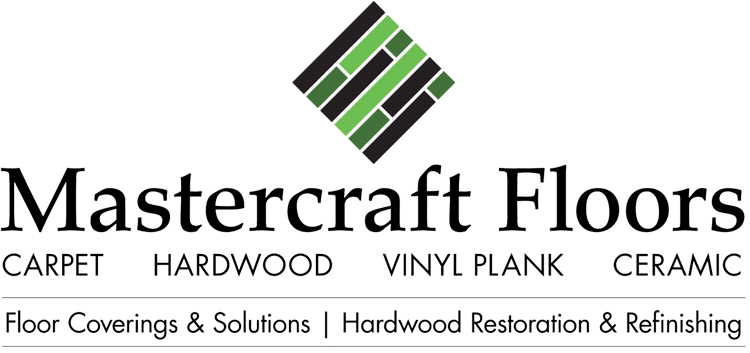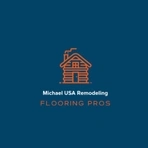Popular Types of Flooring
There's a flooring material for every design preference and price point. In this section, we'll break down the most common types.
Hardwood Flooring
Homebuyers across Arlington seek out hardwood flooring for its beauty and durability. It's available in several varieties to accommodate different designs, from cherry and walnut to maple and oak. However, it's one of the most expensive flooring materials and requires significant upkeep. At a minimum, you'll need to use specialty cleaning products regularly and restore its finish every few years. Since it's susceptible to water damage, it's also not suitable for basements, bathrooms, or laundry rooms.
Engineered Wood Flooring
Engineered wood provides you the timeless look and resilience of hardwood without the extra maintenance. Typically, it uses a layer of real hardwood attached to a plywood substrate. Despite the lower retail cost, it might sound more hollow to walk on, and the thin hardwood layer can only be refinished one time. That said, its lower propensity to warp could still make it a worthy investment.
Laminate Flooring
Laminate floors come in wood and tile finishes, but they all have a particle board base. A strong plastic coating gives them resilience against scratches and simplifies cleaning. However, it's more susceptible to water damage and chipping.
Vinyl Flooring
Maintenance with vinyl floors is as simple as it gets. You can purchase them in luxury vinyl tile (LVT) or luxury vinyl plank (LVP) styles, with each option equally long-lasting. They also come at a budget-friendly price point, somewhere between laminate and engineered wood.
Tile Flooring
Tile flooring is another classy design that can endure for years. Like vinyl, it requires minimal maintenance and is easy to clean. As such, it's perfect for areas prone to moisture like kitchens and bathrooms. However, it requires intensive prep work before installation and can be cold and sleek to walk on. Pricing relies on the material you pick, with porcelain being more expensive than ceramic.
Stone Flooring
Granite, travertine, sandstone, and marble aren't just for the outdoors. Inside, they can give you a bold look and unparalleled water resistance. Despite its unique flair, it's not easy to clean, and long-term maintenance could be a bit more expensive.
Linoleum Flooring
Linoleum is made from linseed oil and cork and can last for decades if cared for properly. It’s an economical option with many design possibilities. However, the softer material is easier to dent or scratch, and it's known to fade with sun exposure. It’s also not suitable for moisture-prone spaces like kitchens and bathrooms.
Carpet
Carpet is the most affordable flooring option. It can make a space feel more homey and is great for muffling sound. You don’t have to worry about scratches or dents, and the cushioning makes it a safer choice for young children. However, the fibrous material easily holds onto odors, stains, and moisture, which isn't ideal for allergy sufferers in Arlington's perennially-high pollen levels.
How to Choose a Arlington Flooring Company
Choosing a floor installer is just as critical as choosing a design. To ensure you get the most value, consider each of the following criteria.
Reputation and Reviews
The most crucial thing to research about any flooring company is its reputation. Check review sites like Yelp, the Better Business Bureau (BBB), Google, and Trustpilot to see what previous clients have to say. Even the best flooring installers will have both positive and negative reviews. Look for how a provider responds to complaints and interacts with others. If it strives for a satisfactory resolution and acts in good faith, that's an encouraging sign. However, if it's argumentative or has a high negative-to-positive review ratio, it's best to avoid working with it.
Portfolio and References
Most floor installers keep portfolios of their proudest projects. We recommend requesting a copy so you can examine the crew's handiwork. Portfolios might also include references from past customers. Don't hesitate to request their contact information so you can discuss their interactions and thoughts about the company.
Specialization and Services
Look for a provider that specializes in the type of flooring you're interested in. For example, a crew might be experienced with carpet but not stone. Equally important is a provider's service offerings. At the very least, it should offer cleanup and haul-away for your old flooring materials. However, if you're feeling lost in all the style, material, and color choices, you can also look for contractors with design teams.
Cost
Cost is crucial to consider, but it should be less important than quality in your selection process. We recommend getting at least three different quotes for your flooring job to compare pricing and workmanship. Many companies offer on-site and online estimates to simplify the process.
Warranties and Guarantees
You should look for two different warranties in your company search. A manufacturer's warranty protects you in case of a product defect, while an installer's warranty covers workmanship. Depending on the installer and flooring brand you choose, warranty coverage could be limited to a fixed term. In other instances, it continues for the life of the floor. Ask an installer about its warranty terms, including extensions that could give you a few more years of coverage.
Estimated Timeline
Time management is key to a successful flooring job. Before you agree to work with a company, request an estimated timeline and inquire about what hurdles could impact the project. If a company promises to finish the job by a certain deadline, get that guarantee in writing and communicate your expectations clearly as the work progresses.
Ready to Get a Quote on Your Flooring Project?
Please enter a valid 5-digit zip code!
Frequently Asked Questions About Flooring in Arlington
How much will it cost to install a new floor in Arlington?
See our guides to how much each flooring type typically costs:
What are some of the most popular types of flooring in Arlington?
What are the licensing laws for Arlington flooring companies?
Is it cheaper to buy flooring online?
What is the best type of flooring for a kitchen?
To share feedback or ask a question about this article, send a note to our Reviews Team at reviewsteam@thisoldhousereviews.com.


















